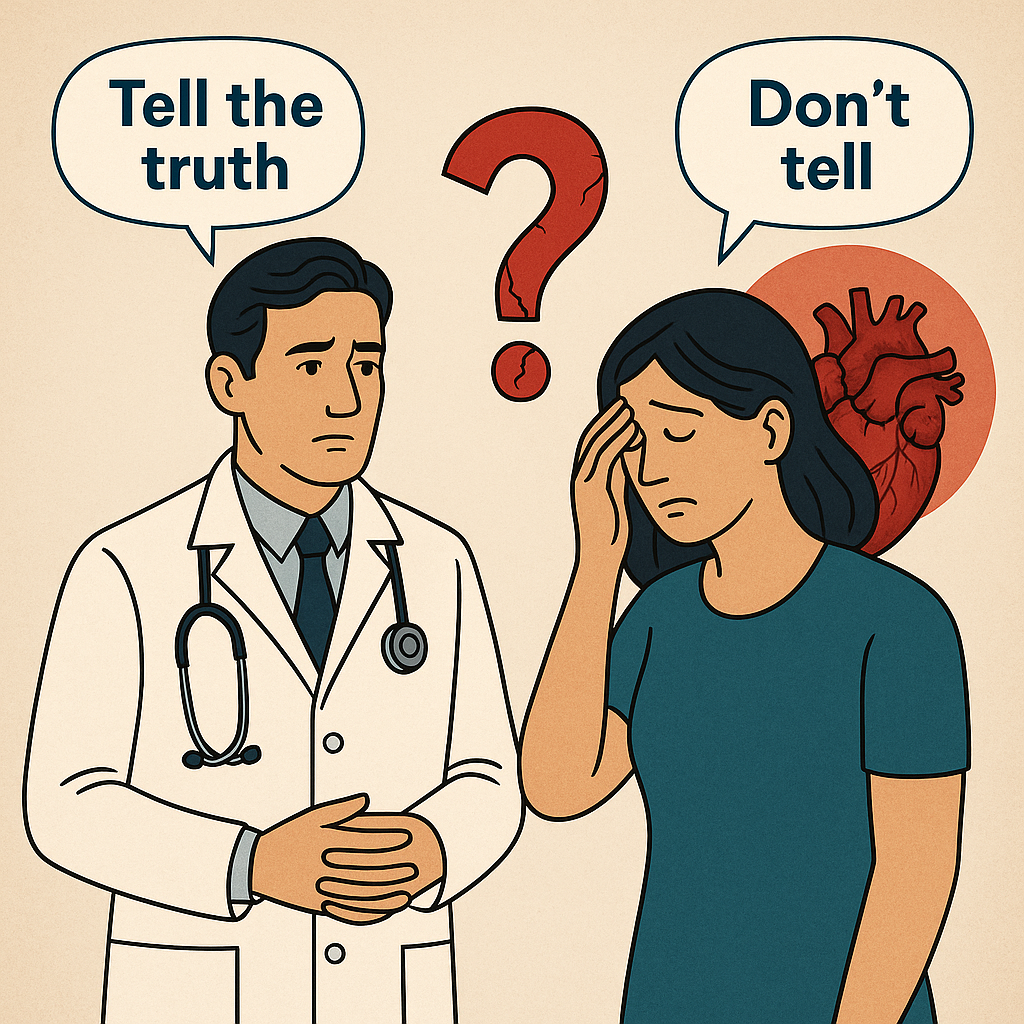Introduction: When Truth Hurts
In medicine, truth is sacred—or at least, that’s what we’re taught. Transparency builds trust. Informed consent requires full disclosure. Patients deserve to know the facts about their health.
But what happens when the truth is unbearable?
Imagine telling a patient they have weeks to live, with no cure, and limited options. Should the doctor deliver the full reality, or soften it to preserve hope? Is truth always ethical—or can it, at times, become a form of cruelty?
In this article, we’ll explore the moral tensions behind medical disclosure. Drawing on medical ethics, psychology, and real-world dilemmas, we’ll ask:
- When should doctors tell the full truth?
- When might withholding information be justified?
- And who ultimately decides what a patient needs to know?
Through these questions, we’ll confront one of the oldest and most difficult issues in medicine: the delicate balance between honesty and compassion.
1. Truth in Medicine: A Modern Principle With Ancient Roots
Telling the truth may seem like an obvious moral duty for doctors today—but it wasn’t always that way.
In ancient medicine, especially in the Hippocratic tradition, “benevolent deception” was often encouraged. Physicians were taught to prioritize the patient’s welfare above all else—even if that meant hiding the truth. After all, why tell someone they are dying if it only causes despair and accelerates decline?
This view held for centuries. In fact, until the late 20th century, it was common practice in many countries for doctors to withhold a cancer diagnosis from patients, informing the family instead. The reasoning? Protect the patient’s hope, and perhaps, their will to live.
But in the modern era, a major shift occurred. The rise of bioethics in the 1960s and 70s brought with it a new emphasis on patient autonomy—the right to make informed decisions about one’s own body and future. Full disclosure became the gold standard, grounded in the belief that:
“To be truly free, a person must know the truth about their condition.”
This shift was codified in ethical guidelines around informed consent, and reinforced by legal systems that viewed non-disclosure as a violation of rights.
But this “truth-first” approach, while ethically sound on paper, still raises serious dilemmas in practice—especially in cases where the truth can do more harm than good.
Should a doctor tell a 90-year-old patient that their illness is terminal, if doing so may cause panic or depression? What if the patient doesn’t want to know?
In real-world medicine, truth isn’t just a principle—it’s a question of timing, delivery, and emotional weight. Which brings us to the next challenge: the psychology of disclosure.
2. Psychological Dimensions: Hope, Denial, and the Weight of Words
Telling the truth in medicine is never just about facts—it’s about how those facts land in a human mind.
A terminal diagnosis doesn’t just inform—it transforms. It can crush hope, destabilize identity, or trigger emotional collapse. Patients often respond with shock, anger, denial, or profound existential fear. Even when delivered with care, truth can feel like a verdict rather than a gift.
Hope, on the other hand, is a powerful therapeutic force. Studies in oncology and palliative care have shown that patients with a sense of hope, even unrealistic hope, often report better emotional well-being and even improved physical outcomes. Hope can motivate people to seek second opinions, participate in clinical trials, or simply live more fully in the time they have left.
So what happens when truth destroys hope?
This is where the ethics of truth-telling gets blurry. Some doctors choose to cushion reality, using softer language (“abnormal cells” instead of “cancer”) or staging information gradually to avoid overwhelming the patient. Others practice what’s called “therapeutic privilege”—withholding certain truths temporarily when disclosure might cause serious harm.
Yet even well-intentioned silence can backfire. Some patients intuitively sense they’re not being told everything, leading to mistrust, anxiety, or feelings of betrayal. Others may delay important decisions—like settling affairs or saying goodbye—because they weren’t given the chance to understand the severity of their condition.
Ultimately, the ethical challenge is this:
Can we preserve hope without distorting truth?
And can we deliver truth without destroying the person receiving it?
These questions cannot be answered in the abstract. They depend on context, timing, personality, culture—and most of all, communication.
3. Cultural and Personal Preferences: Not Everyone Wants the Whole Truth
In Western medical ethics, autonomy and informed consent are cornerstones. But not all cultures—or individuals—see truth the same way.In many societies, especially in parts of Asia, the Middle East, and Latin America, families often act as gatekeepers of information. It is common for relatives to ask doctors not to disclose a terminal diagnosis directly to the patient. The reasoning? Shield the patient from psychological harm, maintain social harmony, and let the family bear the emotional burden.To a Western-trained doctor, this might seem like a violation of autonomy. But to many families, compassionate concealment is not deception—it’s love.Even within the same culture, people vary. Some patients want every detail, every probability, every test result. Others say, “Just tell me what to do.” Some explicitly state they don’t want to know if their condition is terminal. For them, ignorance is not fear—it’s freedom.This creates an ethical tension for doctors:
Whose values should guide disclosure? The patient’s? The family’s? The physician’s?
Respecting cultural norms and personal preferences is important—but so is avoiding paternalism. The key is to ask, “How much do you want to know?”That simple question honors autonomy without assuming it looks the same for everyone.Cultural competence in medicine isn’t just about language or rituals—it’s about understanding that truth has different meanings in different moral worlds. What feels like honesty in one context might feel like abandonment in another.Navigating this complexity requires more than ethical theory. It demands empathy, humility, and conversation—qualities that bring us to the heart of the physician’s role.
4. The Doctor’s Dilemma: Between Honesty and Compassion
Doctors are trained to heal. But what happens when healing is no longer possible—and the truth may hurt more than help?
This is the emotional core of the disclosure dilemma. On one hand, the doctor has a duty to inform. On the other, they carry a responsibility to protect. Every word, every pause, every facial expression becomes part of a moral calculation: How much can this person handle? Am I helping, or am I harming?
Some doctors err on the side of full transparency, believing that honesty is inherently respectful—even when it causes pain. Others feel deep discomfort, knowing that what they say may extinguish hope or trigger despair. In moments like these, even the most seasoned physicians can feel paralyzed by the weight of their words.
There is no algorithm for this. No textbook can teach the right balance of honesty and empathy. It requires emotional intelligence, intuition, and sometimes, moral courage—especially when family members or hospital policies push in opposing directions.
Doctors are also human. They carry their own fears, biases, and emotional exhaustion. Some may avoid difficult conversations to shield themselves from discomfort. Others might over-disclose as a way to avoid ambiguity or legal liability. In both cases, the patient may suffer—not from disease, but from the way it was communicated.
What’s needed is not just knowledge, but narrative skill. A physician must not only convey information, but also hold space for meaning. This means recognizing that truth isn’t a pill to swallow—it’s a story to live with.
In that sense, disclosure becomes less about choosing between truth and compassion—and more about telling the truth compassionately.
5. Conclusion: Truth as a Form of Care
Should doctors always tell the truth?
There is no universal answer—because there is no universal patient.
What we do know is this: truth matters, but so does the way it is delivered. A cold, clinical truth can wound just as much as a kind lie. But truth shared with empathy—with attention to timing, context, and the patient’s emotional world—can become a powerful form of care.
In a time of information overload and growing distrust in institutions, the physician’s role as an honest, compassionate guide has never been more vital. Not every patient wants to hear everything. But every patient deserves to be treated with dignity—and part of that dignity is being invited into the truth, not just handed it.
As medicine becomes more advanced, and decisions more complex, we must remember that healing is not always about curing. Sometimes, it’s about accompanying someone through the truth—no matter how painful—with presence, patience, and respect.
Telling the truth is not simply about ethics.
It is about relationship. And in the space between honesty and compassion, true care is born.


